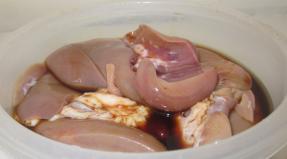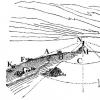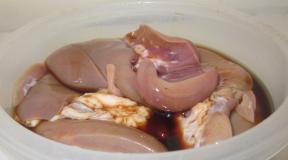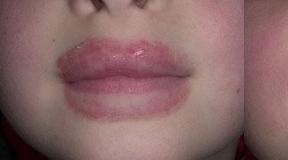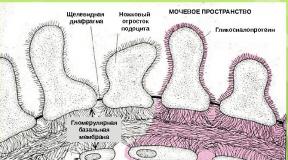How to cure stage 2 alcoholism yourself. Symptoms and treatment of the second stage of alcoholism. Comorbid mental illness
The stages of alcoholism (and the moment where the disease begins) still remain a rather vague category. In most cases, due to the social acceptability of drinking alcohol, addiction develops without others noticing. Most often, relatives begin to sound the alarm when regular drinking starts - and this is stage II or even III.
- prevent alcohol use from becoming an addiction
- build a line of behavior with an alcoholic
- convey to your loved one what consequences the disease may lead to in the near future
One step away from addiction
Many people drink quite regularly, but we are not even talking about the first stage of the disease. Nobody sees a big problem in drinking alcohol during the holidays or at the end of a difficult working day.
Where is the line beyond which the disease begins?
Modern narcologists distinguish the so-called “zero” stage, which in fact is not addiction. At the same time, it has its own stages of gradual development. And if you don’t pay attention to them in time, a person will eventually become an alcoholic.
First stage
- Drinking alcohol occurs sporadically.
- After an excessive dose of drinking in the morning, signs of alcohol poisoning appear (headache, nausea, general weakness), which disappear within a few hours or are easily eliminated with appropriate medications (painkillers, etc.).
- Even the thought of the possibility of a morning “hangover” with the help of another portion of alcohol causes unpleasant sensations in the body.
Second stage
- Alcohol consumption becomes regular.
- A person begins to look for reasons to drink on his own.
- Receiving positive emotions begins to be associated with drinking alcohol.
- In some cases, such a celebration can last for several days (yesterday was a friend’s birthday, and today a big project was completed).
Third stage
- “Libations” occur more than once a week.
- The reasons are becoming increasingly insignificant. Sometimes even far-fetched.
- A person is looking for any excuse for his addiction, so as not to be considered an alcoholic.
Such “everyday drunkenness” indicates that the problem already exists. During this period, it is very important not to let things take their course. Remember - your loved one has approached the dangerous edge, beyond which the first stage of alcoholism begins.
Don't expect him to cope with cravings. One of the main signs of alcoholism is the inability to give up drinking on your own.
During this period, the patient does not yet require serious therapy. The help of psychotherapists will help him stay on the edge and return to a full sober life before a chronic illness develops.
First stage of alcoholism
Unfortunately, the first stage of alcoholism is quite difficult for a lay person to recognize. It is too similar to ordinary everyday drunkenness. Sometimes relatives themselves unwittingly contribute to the development of the disease by supporting the addict in his excuses. It is difficult for any person to realize and accept the fact that a loved one is an alcoholic.
It is important to be vigilant and resist the urge to justify drinking. Sympathy and pity in this situation will become destructive.
Signs to look out for:
- Tolerance to alcohol increases - an increasingly large dose of alcohol is needed to become intoxicated.
- The amount of drinking leads to a “blackout” earlier than it causes a gag reflex (the body’s protective functions to remove toxins are gradually turned off).
- Behavior changes when intoxicated. Alcohol causes increased activity, unbridled fun, unmotivated aggression or dull melancholy (usually the trait that is most characteristic of a person is exacerbated).
- Sometimes memory loss begins already at the first stage of alcoholism. So far, short episodes appear more often. But such forgetfulness indicates disturbances in the functioning of the brain.
- The value system is changing. All hobbies and goals fade into the background, alcohol becomes an important part of the addict’s life.
- Mental dependence sets in. The inability to drink causes a bad mood, aggression or complete apathy. To return “to normal”, another portion of alcohol is required.
At the first stage of alcoholism, the patient can still be helped by the softest methods, which do not impose a strict ban on drinking alcohol, but stimulate a positive perception of a sober lifestyle.
Second stage of alcoholism
At the second stage of alcoholism, it is almost impossible not to notice the developing disease, as well as to justify or ignore the increasing incidence of drunkenness. All the signs clearly indicate a problem that cannot be dealt with without qualified drug treatment:
- Physical dependence appears. It's no longer just a bad mood in the absence of alcohol. The body has built ethanol into its biochemical processes and begins to require the next dose.
- Psychological dependence increases. The alcoholic stops looking for a reason to “libate.” Now this is not only a way to have fun - cases of drunkenness in the workplace are becoming more frequent.
- You lose control over the amount you drink. The addict drinks literally until he passes out - the craving for alcohol remains even in a state of intoxication.
- Developing.
- Amnesia progresses—memory lapses span ever larger periods of time.
- Personal degradation begins - the alcoholic neglects personal hygiene, loses his job, and the only friends he has are drinking buddies. Mental abilities are greatly reduced.
In the second stage of alcoholism, toxins poison the body and gradually lead to irreversible changes. The risk of developing dangerous diseases increases significantly; internal organs constantly work under increased load and “wear out” many times faster than in a healthy person.
Regular binges begin - periods of continuous alcohol consumption over several days and sometimes weeks. The patient is no longer physically able to break out of the vicious circle of “drunkenness - blackout - hangover”. Only a qualified narcologist can do it safely.
It is important to remember that when trying, there is an extremely high risk of provoking various metal-alcohol psychoses, accompanied by delusions and hallucinations. The addict will become dangerous not only to himself, but also to others.
Third stage of alcoholism
The first sign of the third stage of alcoholism is, oddly enough, a sharp reduction in the dose taken. And we are not talking about suddenly returning self-control. It’s just that the liver is no longer able to cope with incoming toxins, alcohol is practically not processed, and a person gets drunk from a minimal amount of alcohol. At the same time, his desire to drink does not go away and, on the contrary, even increases. But he physically cannot drink more - the gag reflex is triggered almost immediately.
By this point, there is no longer a single healthy organ left in the body. Internal resources are practically depleted, and it is only a matter of time - at what point the alcoholic’s heart, liver or kidneys will fail.
Along with physical disorders, the rapid degradation of personality continues - the death of brain cells leads to the loss of simple cognitive functions and social skills developed from childhood. An alcoholic literally loses touch with reality; there is no longer any question of any critical self-perception. Serious problems with speech and communication skills arise.
Against the background of personality disintegration, mental disorders develop (in some cases they can begin as early as the second stage of alcoholism) - in addition to drug treatment, the addict needs psychiatric help.
The problem is that in Russia practically no clinic is ready to work with such “dual diagnoses”. The addict is simply driven between drug treatment and psychiatric dispensaries, convinced that this is “not their case.”
In this regard, Dr. Isaev’s Clinic became the first institution to include a unique treatment program for such patients. Moreover, the center employs psychiatrists who were at the forefront of the development of this technique.
Will treatment help?

It is believed that at the third stage of alcoholism it is no longer possible to help the patient. Dr. Isaev’s clinic is ready to prove that this opinion is wrong.
Yes, the longer the addiction lasts, the more difficult it will be to undergo treatment and the longer it will take for rehabilitation. But individually designed programs make it possible to return even the most difficult patients in the last stages of alcoholism to the most fulfilling life possible.
Complex therapy covers all aspects of a person’s life – physical health, mental health, social skills, and personal integrity. Of course, everything depends on the alcoholic’s “experience” and the characteristics of his body.
But if the addict is still able to at least perceive someone else’s speech, we are ready to join the fight for his future. And we can say that in most cases, a complex of modern techniques allows us to achieve positive dynamics even in situations that are assessed by other specialists as hopeless.
Ekaterina Yartseva talks about the treatment of alcoholism (video)
First stage
Second phase
Third stage
Alcoholism is a serious disease that affects both men and women. Alcohol dependence has the peculiarity of developing, that is, the disease can be divided into the first, second and third (chronic) stages of severity.
It's no secret that alcoholism causes damage to both the physical and psycho-emotional state of a person, and the more severe the stage, the greater the damage.
The only bright spot in this story is that the field of narcology has long been aware of methods for treating alcoholism at any stage, but now they undertake to treat severe degrees of the disease - not all drug treatment centers are number 2 and 3.
If you or your relative are faced with the second or even third stage of alcoholism, do not rush to despair and give up! The medical center in Moscow “12st” works with alcoholics of any severity of addiction and health status. You can turn people away from alcohol, instill a desire to lead a healthy and sober lifestyle, and get help in normalizing family and work relationships within the walls of the clinic.
About the second degree of alcoholism. Signs and symptoms
It is not always possible to understand on your own what stage your loved one’s alcoholism is at. Moreover, many relatives prefer not to notice their loved ones’ problems with alcohol at all.
Of course, if you don’t want one of your relatives to put alcohol at the forefront and replace the normal joys of life such as communication with families, improving their financial situation, pride in themselves from success in hobbies, etc., you should think about it. does alcoholism exist? The sooner you identify the existing problem and find out at what stage of alcohol addiction your relative is, the sooner you can begin treatment without causing severe consequences.
How to recognize the second stage of alcoholism:
- The main symptom of the transition of alcoholism to the second stage is the development of tolerance. If at the first stage of the disease the patient could vomit from large doses of alcohol, then at stage number 2 this stops. The body's endurance appears: an alcoholic can drink liters of vodka, beer or other alcohol and feel sick, much less vomit. This sign is an alarm bell for loved ones and indicates that it is time to begin treatment immediately;
- If at the first stage of the disease the addict could still at least control himself, then at stage number 2 this does not happen. Drink a very small dose of alcohol and decide to stop there? Unfortunately, an alcoholic cannot do this. At the second stage of alcoholism, after a bottle of beer, the patient will begin to “carry” and he will persistently bring himself to the point of severe intoxication;
- Why do we drink alcohol at all? For example, to relax, become more relaxed and cheerful, etc. An alcoholic at stage number 2 starts drinking only because “it’s necessary and there’s no other way.” Alcohol begins to be necessary. Under the influence of alcohol, the patient becomes aggressive, cheeky, and loses control over behavior. May be rude or hit when trying to take the bottle from him. Usually, around a second-stage alcoholic, those around him begin to experience fear and shame;
- After drinking alcohol, the patient feels a hangover the next morning: severe headache, nausea, “twisting” of muscles, tremors of limbs, convulsions, etc. At the same time, the face turns purple and the eyes become cloudy. Compared to stage 1 alcoholism, these symptoms do not go away on their own after a couple of hours. A hangover in the second degree of addiction is much stronger; it completely deprives the alcoholic of the ability to think sensibly and perform physical actions. In this state, the alcoholic refuses medical help. Why is she? After all, you can just drink a glass in the morning and your condition will return to normal. This approach indicates that stage 2 of alcoholism has completely occurred. And once it has appeared, pseudo-binges will appear, and then, when the third stage is reached, full-fledged binges will appear;
- At stage 2 of alcoholism, pseudo-binges often occur. The picture is this: your loved one drinks for 1-3 days without stopping, and then doesn’t drink or barely drinks for several months. This state of affairs should not be considered something like spontaneous alcoholism. The disease with pseudo-binges never disappears, and also undermines the physical and mental state of your loved one;
- At the second stage of alcoholism, a person’s character begins to change dramatically. Previously, he could have been an exemplary family man, a workaholic or simply a hard-working person, he took care of the house, housekeeping, had hobbies and many close friends. At stage number 2 of alcoholism, the patient begins to lie, remain silent, aggressive and irritated. All that became important to him now was to drink alcohol. The level of intelligence, the ability to speak logically, quickly solve mental problems, etc. are noticeably lost.
Consequences
At stage 2 of alcoholism, the consequences are predominantly mental, since the alcoholic’s health still allows him to drink, and the body, although weak, is holding on.
Consequences of addiction:
- Already at the second stage of alcoholism, delirium tremens may occur. It is characterized by the occurrence of hallucinations and paranoia in an alcoholic. The patient may feel that they want to kill him, that someone is chasing him, that he is being attacked by imaginary images. At the same time, the alcoholic loses the sense of time and space. Often, in the 2nd degree of alcoholism, a person occasionally experiences such clouding of reason and, fearing that he will be attacked, tries to hide, becomes suspicious, is afraid to sleep and eat, in general, he brings himself to an even more severe physical and mental state. Auditory hallucinations cannot be ruled out either;
- Paranoia is the most common phenomenon occurring in the second stage of alcoholism. Have you ever heard your loved one, while heavily intoxicated, say that everything that is happening around is a conspiracy of the intelligence services, aliens and other forces? Did he say that he has bugs on him and is being monitored? Or maybe he was kidnapped for experiments? None of this is a joke or a reason to laugh. This indicates a gradual transition from the second stage of alcoholism to the third. Do not be indifferent to this, but seek help from specialists. How long will your loved one carry alcoholic delirium? One, two, five years? It is possible that much earlier he will commit a crime or suicide;
- Drunkenness almost never comes alone; it entails side diseases. For example, a stage 2 alcoholic has no control over sexual desire. He begins to engage in promiscuous sexual relations, which threatens:
— Firstly, the deterioration of family relationships. A husband or wife in their right mind will not tolerate such antics. It’s not far from divorce and other “pleasant” accompanying things: division of property, division of children, possibly deprivation of rights, etc.;
— Secondly, there is a high risk of contracting some kind of sexually transmitted disease, because with alcoholism of the second stage, all sense of responsibility and sanity is lost;
- Thirdly, the appearance and behavior of the alcoholic changes, the legal spouse begins to show intimacy. This makes the alcoholic jealous, suspect his spouse of cheating, insult him in every possible way and even beat him, in general, make his partner’s life unbearable.
How to start fighting addiction?
At the second, as well as at the third stage of alcoholism, it is difficult to take independent measures to combat the deadly habit. Simple self-control and willpower, which most often fall into deep sleep during these stages of addiction, are not enough.
It is imperative that if alcoholism progresses, you should consult a specialist. Residents of Moscow will be able to get help at the 12st drug treatment center in any condition and at any degree of alcohol dependence.
Why is it important to contact a specialist:
- The doctor will conduct treatment at all stages: cleansing the body, coding (that is, setting a block on the ability to drink alcohol), conducting psychological rehabilitation;
- If alcoholism has caused side diseases, work will be done to eliminate them;
- The alcoholic will be under constant supervision by narcologists and psychologists, which guarantees complete management of the disease and the elimination or prevention of complications;
- The patient will not have a chance to relapse and go on a binge again. Because the doctors will, firstly, observe him, and secondly, they will instill in him the idea of the harm and mortal danger of alcohol. An excited instinct of self-preservation will help a person begin to cope with the desire to get drunk.
Why choose the 12st clinic? For many reasons. But the two main criteria why people turn to us are the following:
- Our specialists have many years of experience and have been able to guide the course of the illness of many severely dependent drunkards from beginning to end. Even the most “severe” patients left our clinic completely healthy and ready for a normal life;
- We offer affordable prices for all types of services, the range of which is very wide. You can arrange for doctors to visit your home to relieve hangovers and binge drinking, complete a full course of treatment for stage 1, 2 or 3 alcoholism, and also contact us for rehabilitation.
Find out more about our work by booking your first free and anonymous appointment. Registration is carried out by calling 8 800 775-6 and 8 495 151-80-45.
Alcoholics- people who, as they believe, have achieved everything in life. True lovers of alcohol will never recognize addiction as a disease, much less that he is sick. They will insist that as soon as they want, they can stop drinking at any time.
There is a small percentage of people who are aware of their problem and want to get rid of it. But, most often, it is relatives who sound the alarm, because they are the ones who suffer the most when there is an alcoholic in the family.
Few people recognize alcoholism as a real drug disease that can easily change the metabolism in our bodies, which is why an alcoholic can simply lose control over himself even after drinking the first 100 grams.
With each glass, a person needs to take another to feel this alcoholic ecstasy, a feeling of lightness in the body.
Over time, the immune system weakens and the person begins to get sick more often.
Second stage

The second is identical to the first, but with completely different behavior and different symptoms. The disease is already progressing, the person begins to change in appearance. Stage 2 of alcoholism is characterized by an even greater craving for strong drinks and the appearance of a severe hangover.
After any intake of alcohol, the patient is increasingly tempted to get drunk, and over time this desire intensifies.
When a person who is in the second stage of alcoholism drinks alcohol, he develops a feeling of oblivion (when, based on the sensations in the body, you understand that everything is fine, like some kind of euphoria).
A person drinks and feels light; the dose increases each time. But our body is able to take alcohol and process it only in small doses.
Severe hangover

This condition appears in cases where the body cannot or does not have time to process all the alcohol taken.
Typical signs of a hangover are:
- headache;
- nausea;
- "hands are shaking";
- feeling of weakness in the body.
When a hangover occurs, the process has already started and the disease cannot be stopped. However, it is possible to find a cure for this terrible disease.
How to determine that a person is addicted?

There are main six signs:
- complete absence of a gag reflex when taking a significant amount of alcohol;
- loss of self-control;
- severe morning hangover;
- change in appearance;
- personality degradation;
- memory loss.
In the second degree of alcoholism, excitement appears at the thought of alcohol, joy before an event or holiday, and anticipation of drinking.
The second stage is very different from the first:
- alcohol brings cheerfulness and tones the body, without it it is difficult to eat, fall asleep and wake up;
- cheerful behavior gives way to irritation and aggression, memory lapses begin to appear;
- People with the second degree of alcoholism now think only about drinking.
In an addict, when moving to stage 2, the body becomes very accustomed to strong drinks.
At this stage, the body has already rebuilt itself in such a way that it cannot function normally without drinking alcohol.
Addiction is already visible to the naked eye not only to the patient himself, but also to the society around him. At the second stage, a person feels tired, as a result of which attempts to quit alcohol may slip through.
Advanced (second) stage of the disease

At this stage, along with manifest psychosis, withdrawal syndrome (physical dependence on alcohol) appears.
It occurs 9-20 hours after the patient stops drinking alcohol and is visible as a complex of such ailments: mental, neurological, somatovegetative abnormalities.
Psychosis manifests itself in sadness, loneliness (which is often the cause of suicide), irritable behavior, dysphoria (aggression), feelings of fear and anxiety (these are signs of developing psychosis).
People complain of poor sleep and headaches. Neurological symptoms manifest themselves in impaired coordination of movements. The somatic status includes problems with heartbeat, tachycardia, shortness of breath, and increased pressure in the arteries.
Alcoholics of the second degree are often concerned about symptoms such as:
- decreased appetite;
- nausea;
- vomit;
- thirst.
The consequences of this syndrome can be alcoholic psychoses:
- Korsakoff psychosis;
- myocardial infarction;
- acute hallucinosis.
For most patients, alcoholism in the second stage is already a reason to contact the staff of medical institutions. Uncomplicated withdrawal syndrome upon completion of binge drinking goes away without treatment in 2-7 days.
Since drinking alcohol leads to a softening or disappearance of the previously listed symptoms, the craving for alcohol at stage 2 becomes higher than a person’s willpower.
Without looking at the promises given earlier or the prohibitions (complete lack of self-control), alcoholics continue to take alcohol or surrogates. To buy alcohol, patients are ready to steal, sell family valuables, etc.
Degradation of a person as an individual is observed:
- the addict limits himself only to searching for alcohol;
- no longer strives to achieve anything;
- make false promises;
- responsibility is reduced to a minimum.
A level 2 alcoholic can drink alcohol every day (it will be a joy for him).
But, as a rule, more often than not, binge drinking for several days is accompanied by periodic breaks associated with a lack of money to buy alcohol, problems at work, long trips, etc.
In the second period of the disease, pronounced somatic consequences from constant drinking of alcohol are almost always noticed:
- ulcer;
- gastritis;
- cardiac diseases;
- necrosis;
- bleeding.
But, most of these ailments that occur at this stage are reversible. As a rule, due to their causes, premature deaths occur or people become disabled.
Treatment methods for second-degree addiction

In modern medicine, the disease is treated very quickly and effectively. When undergoing the correct course of therapy, out of 100 alcoholics, 80-90 stop drinking alcohol.
Treatment usually includes several stages:
- hangover relief;
- prevention of possible breakdowns and return to binge drinking;
- aversive therapy can be used only in cases where the alcoholic resists or categorically does not even want to begin treatment. This technique uses medications that cause disgust in the patient, acting on primary reflexes. In most cases, the drug Disulfiram is used. It is harmless for people who do not drink alcohol, but when combined, a person begins to feel unwell and has unpleasant sensations. The good old “grandmother’s” method of treating alcohol addiction recommends using a decoction of thyme (when combined with ethyl, it can cause a strong gag reflex);
- detoxification of the body is a set of measures similar to those used for severe poisoning. This method helps an alcoholic cleanse his body of waste and toxins. Frees the patient from physical dependence, but it remains in the head;
- Psychological help will help only when an alcoholic in the second stage admits that he is addicted and wants to cope with the problem in order to preserve all his values in life and social position. In practice, psychological therapy methods are highly effective. About 75-85% of patients undergoing this method of treatment again recognize the harm of alcohol and experience a feeling of disgust for it;
- social adaptation - there are times when an alcoholic himself wants to get rid of his illness, but he simply does not succeed. In such cases, this technique helps well. Social adaptation will help only in cases where the addict himself wishes or wants it.
Treatment of alcohol addiction requires not only the use of special medications, but also psychological therapy.
To determine how to get rid of addiction, you need to seek the help of specialists; doctors will help and advise effective methods.
Collapse
Alcoholism is a disease that occurs in a person due to the abuse of alcoholic beverages. Many call it a bad habit, but this is fundamentally wrong, since drinking alcohol leads to the development of severe psychological dependence. The first stage of the disease is not always recognized by relatives and the patient himself, but the second stage of alcoholism already manifests itself with special symptoms. At this stage, it is necessary to urgently provide assistance to the person, since the disease can become chronic, in which irreversible complications arise.
Not everyone can notice the line between the first and second stages of alcoholism. As this stage develops, the duration of the binges gradually increases, and the intervals between them become smaller. The second stage of alcoholism lasts from 5 to 15 years. It all depends on how much alcohol a person drinks. It is characterized by a daily dose of alcohol of 500 ml or more. In women, addiction to alcohol largely depends on how regularly they drink alcohol. The amount consumed is not so important. And for men, both factors are important. Therefore, women are more susceptible to the development of alcoholism and the stages pass from one to another also faster. Many doctors claim that it is impossible to cure female alcoholism at advanced stage 2.
When a person drinks alcohol at this stage, his mood immediately improves. But the dose is already higher than in the first stage.
A distinctive feature of stage 2 is a high level of tolerance to alcoholic beverages. This moment is very dangerous for the health and life of an alcoholic. In addition, a person at this stage often does not overindulge in alcohol. If there is a lack of money, an alcoholic can use pharmaceutical tinctures, cologne and other types of surrogates, which leads to serious and rapid health problems. The reason for this is the loss of social status, work, family and, in general, the degradation of personality. A person cannot independently fully assess the danger of the situation and his goal is only the next dose of alcohol.
Attention! The second stage is characterized by the fact that a person drinks alcohol no longer to improve his mood, but to satisfy the physical needs of the body.
Symptoms and signs
Intoxication of the body at stage 2 of alcoholism already manifests itself as acute symptoms. These include headache, nausea, vomiting, tremors of the limbs, tachycardia. For these signs to go away, you need another dose of alcohol.
An alcoholic can be recognized by the following psychological signs:
- periods of aggression and anger;
- depression, apathy;
- inappropriate actions;
- tendency to conflict;
- constant craving for drinking alcoholic beverages.

Already at this stage, long-term drinking bouts appear. But it is typical that after drinking a person is not inhibited and performance increases while intoxicated. In addition, a person grows faster and he performs both physical and mental activities highly productively. After alcohol leaves the body or its concentration decreases, the psycho-emotional state changes, and the person develops an irresistible craving for alcohol.
When an alcoholic is sober, he is lethargic, gets tired quickly, and all his negative qualities appear. In general, the alcoholic begins to degrade. His intellectual abilities are declining, and solving ordinary everyday problems becomes a difficult task.
Another symptom is insomnia. A person cannot fall asleep without a dose of alcohol, but if he drinks a large amount of alcohol, he will become active and will not be able to fall asleep either. Along with insomnia, an alcoholic may have nightmares.
In the second stage of alcoholism, a person goes into prolonged binges, after which a seizure often occurs. Signs of such a seizure may include convulsions during which a person may bite their tongue, as well as involuntary urination.
After heavy drinking, a person becomes a victim of hallucinations, delirium tremens, and paranoid ideas. And also, many people experience alcoholic jealousy. This is a personality disorder in which an alcoholic begins to be pathologically baselessly jealous of his partner, not seeing his problems and the true causes of problems in the family.
A characteristic condition for 2nd degree alcoholism is “Alcoholic Korsakovsky” psychosis. This complication from drinking alcohol is manifested by impaired sensitivity of the limbs - its absence or severe pain. Another symptom of this psychosis is memory disorders. Sometimes it gets to the point that a person wakes up in his house and cannot remember where he is.
Treatment
Stage 2 of alcoholism is the case when treatment brings positive results, but it will not be possible to cope without the help of specialists. The treatment is complex and will require the help of many doctors.
The first and main condition for starting therapy is a complete abstinence from alcohol. Addiction remains for life, so if a person starts drinking alcohol in small doses after treatment, sooner or later this will lead to relapse and binge drinking.
Treatment tactics:
- Detoxification.
- Psychological rehabilitation.
- Social adaptation.
- Drug treatment is aimed at eliminating concomitant diseases and relieving characteristic symptoms.
Drug therapy
Treatment with medications also takes place in several stages. The first is detoxification, which cleanses the body of toxic substances and breakdown products of ethyl alcohol. Detoxification therapy relieves the patient of physical dependence, that is, hangover syndrome. Also, metabolic processes and sleep begin to normalize. Detoxification drugs are Unithiol, Sodium thiosulfate.
A special place in drug therapy is given to the correction of mental disorders. In this case, sedative or psychotropic drugs are prescribed. This helps relieve symptoms such as tension, irritability, anxiety, and also has a general vegetative stabilizing effect. Drugs – Aminazine, Levomepromazine.
It is important that psychotropic medications should only be prescribed by a qualified specialist, and they should be taken only according to the prescribed regimen and dosage. Since uncontrolled use of these drugs can lead to dependence on them. Tranquilizers include medications such as Elenium, Trioxazine, Diazepam.
Another group of drugs are nootropics. They help normalize metabolic processes in the body, as a result, the craving for alcohol will become less pronounced.
There is such a procedure as “coding” an alcoholic. To do this, a person is injected with Disulfiram, which, when interacting with alcohol, provokes unpleasant symptoms - headache, dizziness, tachycardia, vomiting, etc.

The main condition of therapy is complete abstinence from alcohol.
Attention! Drug therapy is also prescribed if other concomitant diseases have been diagnosed. For example, gastritis, peptic ulcer, alcoholic hepatitis, etc.
Psychological method
An alcoholic must undergo psychological rehabilitation after undergoing drug therapy. Since the second stage of alcohol addiction develops a persistent psychological dependence, that is, the problem of an alcoholic sits deep in the head and a person will not be cured simply by digging through it. Sometimes it takes people 6-8 or more months to complete treatment.
One of the most famous programs around the world is the 12 step method. It involves self-analysis of the patient, changing his thinking and assistance on a group basis. It is important that a person is isolated from everything for some time in order to begin to change.
Social adaptation is a stage of treatment that takes place at home. A psychologist helps a person adapt to society, return to work, and renew relationships with family members. It is also recommended that an alcoholic attend Alcoholics Anonymous meetings.
Forecast
It is possible to cure stage 2 alcoholism only with full treatment prescribed by doctors. And also with the full support of family and friends. This stage of the disease is already a severe psychological dependence on alcohol. Therefore, people often break down and go on binges again. A positive result is observed only in those who are fully aware of their disease.
←Previous article Next article →Alcoholism – a disease that occurs with systematic alcohol abuse, characterized by mental dependence during intoxication, somatic and neurological disorders, and personality degradation. The disease can also progress with abstinence from alcohol.
In the CIS, 14% of the adult population abuse alcohol and another 80% drink alcohol moderately, which is due to certain drinking traditions that have formed in society.
Factors such as conflicts with family, an unsatisfactory standard of living, and the inability to realize oneself in life often lead to abuse. At a young age, alcohol is used as a way to feel inner comfort, courage, and overcome shyness. In middle age, it is used as a way to relieve fatigue, stress, and get away from social problems.
Constantly turning to this method of relaxation leads to persistent addiction and the inability to feel inner comfort without alcohol intoxication. Depending on the degree of dependence and symptoms, several stages of alcoholism are distinguished.
Stages of alcoholism
First stage of alcoholism
The first stage of the disease is characterized by an increase in doses and frequency of alcohol intake. A syndrome of altered reactivity occurs, in which alcohol tolerance changes. The body’s protective reactions against overdose disappear, in particular, there is no vomiting when consuming large doses of alcohol. With severe intoxication observed palimpsests - memory losses. Psychological dependence is manifested by a feeling of dissatisfaction in a sober state, constant thoughts about alcohol, elevating the mood before drinking alcohol. The first stage lasts from 1 to 5 years, while attraction is controllable, since there is no physical dependence syndrome. A person does not degrade and does not lose the ability to work.
Complications of alcoholism of the first stage primarily manifest themselves in the liver, which occurs alcoholic fatty degeneration . Clinically, it is almost not manifested; in some cases, a feeling of fullness of the stomach may occur. The complication can be diagnosed by the enlargement and dense consistency of the liver. At The edge of the liver is rounded, it is somewhat sensitive. With abstinence, these signs disappear.
Complications from the pancreas are acute and chronic . In this case, abdominal pain is noted, which is localized on the left and radiates to the back, as well as a decrease in , nausea , flatulence , unstable chair.
Alcohol abuse often leads to alcoholism , in which there is also no appetite and nausea and pain in the epigastric region occur.
Second stage
Alcoholism of the second stage has a period of progression from 5 to 15 years and is characterized by an increase in the syndrome of altered reactivity. Alcohol tolerance reaches a maximum, so-called pseudo-binges , their frequency is not related to the patient’s attempts to get rid of his addiction to alcohol, but to external circumstances, for example, lack of money and the inability to get alcohol.
The sedative effect of alcohol is replaced by an activating one, memory loss when drinking large amounts of alcohol is replaced by the complete end of intoxication. At the same time, daily drunkenness is explained by the presence of mental dependence syndrome; in a sober state, the patient loses the ability to mentally work, and mental activity is disorganized. A syndrome of physical alcohol dependence occurs, which suppresses all feelings except the desire for alcohol, which becomes uncontrollable. The patient is depressed, irritable, incapacitated; after drinking alcohol, these functions return to their place, but control over the amount of alcohol is lost, which leads to excessive intoxication.
Treatment of alcoholism in the second stage should be carried out in a specialized hospital by a doctor narcologist or psychiatrist. Abrupt withdrawal from alcohol causes such somatoneurological symptoms of alcoholism as, mydriasis , hyperemia upper body, fingers, nausea, vomiting, intestinal weakness, pain in the heart, liver, headaches. Mental symptoms appear: personality degradation, weakening of intelligence, delusional ideas. Anxiety, night restlessness, and convulsive attacks often occur, which are harbingers of acute psychosis - alcoholic delirium, popularly called delirium tremens .
Complications of second-degree alcoholism from the liver are presented alcoholic hepatitis , often chronic. The disease is more common in a persistent form than a progressive one. Like complications in the first degree, shows few clinical symptoms. The complication can be diagnosed by gastrointestinal pathology, heaviness appears in the epigastric region of the stomach, right hypochondrium, mild nausea and flatulence are observed. On palpation, the liver is compacted, enlarged and slightly painful.
Alcoholic gastritis in the second stage of alcoholism may have symptoms masked as manifestations of withdrawal syndrome, the difference being painful repeated vomiting in the morning, often mixed with blood. On palpation, pain is observed in the epigastric region.
After prolonged drinking bouts, acute alcoholic myopathy develops, weakness and swelling appear in the muscles of the thighs and shoulders. Alcoholism most often causes non-ischemic heart diseases.
Third stage
Alcoholism of the third stage differs significantly from the previous two; the duration of this stage is 5-10 years. This is the final stage of the disease and, as practice shows, most often it ends in death. Alcohol tolerance decreases, intoxication occurs after small doses of alcohol. Binges end in physical and psychological exhaustion.
 Many days of drunkenness can be replaced by long-term abstinence, or systematic daily alcoholism persists. There is no activating effect of alcohol, intoxication ends in amnesia. Mental dependence does not have pronounced symptoms, since at the third stage of alcoholism deep mental changes occur. Physical dependence, for its part, manifests itself quite strongly, determining the way of life. The person becomes rude and selfish.
Many days of drunkenness can be replaced by long-term abstinence, or systematic daily alcoholism persists. There is no activating effect of alcohol, intoxication ends in amnesia. Mental dependence does not have pronounced symptoms, since at the third stage of alcoholism deep mental changes occur. Physical dependence, for its part, manifests itself quite strongly, determining the way of life. The person becomes rude and selfish.
In a state of intoxication, emotional instability manifests itself, which represents the symptoms of alcoholism; cheerfulness, irritability, and anger unpredictably replace each other.
Personality degradation, decreased intellectual abilities, and inability to work lead to the fact that an alcoholic, not having the means to buy alcoholic beverages, uses surrogates, sells things, and steals. The use of such surrogates as denatured alcohol, cologne, polish, etc. leads to serious complications.
Complications of stage three alcoholism are most often represented by alcohol liver cirrhosis . There are two forms of alcoholic cirrhosis - compensated And decompensated form. The first form of the disease is characterized by persistent anorexia nervosa, flatulence, fatigue, and low-apathetic mood. Thinning of the skin occurs, white spots and spider veins appear on them. The liver is enlarged, dense, and has a sharp edge.
The patient's appearance changes greatly, sudden weight loss occurs. The decompensated form of liver cirrhosis differs in three types of clinical symptoms. These include portal hypertension, which leads to hemorrhoidal and esophageal bleeding, ascites - accumulation of fluid in the abdominal cavity. Jaundice is often observed, in which the liver is significantly enlarged; in severe cases, liver failure occurs, with the development of coma. The patient has an increased content of , which gives the skin a jaundiced or earthy tint.
Diagnosis of alcoholism
The diagnosis of alcoholism can be suspected by a person’s appearance and behavior. Patients look older than their years; over the years, the face becomes hyperemic and skin turgor is lost. The face takes on a special look of volitional promiscuity due to the relaxation of the orbicularis oris muscle. In many cases, there is uncleanliness and negligence in clothing.
Diagnosis of alcoholism in most cases turns out to be quite accurate, even when analyzing not the patient himself, but his environment. Family members of a patient with alcoholism experience a number of psychosomatic disorders, neuroticism or psychotization of a non-drinking spouse, and pathologies in children. Most common in children whose parents abuse alcohol systematically, this congenital small brain failure . Often such children have excessive mobility, they are not concentrated, and have a desire for destruction and aggressive behavior. In addition to congenital pathology, the development of a child is also affected by a traumatic situation in the family. In children it is found logoneurosis , , night terrors, behavioral disorders. Children are depressed, prone to suicide attempts, and often have difficulties with learning and communicating with peers.
In many cases, pregnant women who abuse alcohol experience birth alcoholic fruit . Fetal alcohol syndrome is characterized by gross morphological abnormalities. Most often, the pathology of the fetus consists of irregular head shape, body proportions, spherical, deep-set eyes, underdevelopment of the jaw bones, and shortening of the tubular bones.
We have already briefly described the treatment of alcoholism depending on its stages. In most cases, relapse may occur after treatment. This is due to the fact that treatment is often aimed only at eliminating the most acute manifestations of alcoholism. Without properly conducted psychotherapy and lack of support from loved ones, alcoholism recurs. But as practice shows, psychotherapy is an important component of treatment.
 The first stage of treatment for alcoholism is the elimination of acute and subacute conditions caused by intoxication of the body. The first step is to interrupt the binge and eliminate withdrawal symptoms. In later stages, therapy is carried out only under the supervision of medical personnel, since delirious syndrome
, which occurs when a binge is interrupted, requires psychotherapy and a number of sedatives. Relief of acute alcoholic psychosis involves quickly putting the patient to sleep with dehydration and support of the cardiovascular system. In cases of severe alcohol intoxication, treatment of alcoholism is carried out only in specialized hospitals or in psychiatric departments. In the early stages, anti-alcohol treatment may be sufficient, but more often when quitting alcohol, a deficit in neuroendocrine regulation occurs, the disease progresses and leads to complications and organ pathology.
The first stage of treatment for alcoholism is the elimination of acute and subacute conditions caused by intoxication of the body. The first step is to interrupt the binge and eliminate withdrawal symptoms. In later stages, therapy is carried out only under the supervision of medical personnel, since delirious syndrome
, which occurs when a binge is interrupted, requires psychotherapy and a number of sedatives. Relief of acute alcoholic psychosis involves quickly putting the patient to sleep with dehydration and support of the cardiovascular system. In cases of severe alcohol intoxication, treatment of alcoholism is carried out only in specialized hospitals or in psychiatric departments. In the early stages, anti-alcohol treatment may be sufficient, but more often when quitting alcohol, a deficit in neuroendocrine regulation occurs, the disease progresses and leads to complications and organ pathology.
The second stage of treatment is aimed at establishing remission. A complete diagnosis of the patient and treatment of mental and somatic disorders are carried out. Therapy at the second stage of treatment can be quite unique; its main task is to eliminate somatic disorders, which are key in the formation of pathological cravings for alcohol.
Non-standard methods of therapy include Rozhnov's technique , which consists of emotional stress therapy. A good prognosis for treatment is provided by hypnotic influence and psychotherapeutic conversations preceding it. During hypnosis, the patient is instilled with an aversion to alcohol and a nausea-vomiting reaction to the taste and smell of alcohol. The method of verbal aversive therapy is often used. It consists of adjusting the psyche using the method of verbal suggestion, to respond with a vomiting reaction to drinking alcohol, even in an imaginary situation.
The third stage of treatment involves prolonging remission and returning to a normal lifestyle. This stage can be considered the most important in the successful treatment of alcoholism. After the two previous stages, the person returns to his previous society, to his problems, to friends who in most cases are also alcohol dependent, to family conflicts. This has a greater impact on the relapse of the disease. In order for a person to be able to independently eliminate the causes and external symptoms of alcoholism, long-term psychotherapy is required. Autogenic training has a positive effect and is widely used for group therapy. The training is to normalize autonomic disorders and relieve emotional stress after treatment.
Applicable behavioral therapy , the so-called lifestyle correction. A person learns to live in a sober state, solve his problems, acquiring the skill of self-control. A very important stage in restoring normal life is achieving mutual understanding in the family and understanding your problem.
For successful treatment, it is important to achieve the patient’s desire to get rid of alcohol addiction. Compulsory treatment does not produce the same results as voluntary treatment. But still, refusal of treatment requires the local narcologist to forcibly refer the patient for treatment to a medical treatment facility. Therapy in the general medical network does not give positive results, since the patient has open access to alcohol, is visited by drunken friends, etc.
In cases where alcohol abuse began in adulthood, an individual approach to the choice of therapy is required. This is due to the fact that somatoneurological symptoms of alcoholism appear much earlier than the onset of addiction and mental disorders.
Mortality in alcoholism is most often associated with complications. Decompensation of vital organs occurs due to prolonged binge drinking, withdrawal states, and intercurrent diseases. 20% of elderly patients with alcoholism have signs, a little less common acute Gaye-Wernicke syndrome . Attacks of both diseases during alcohol intoxication can be fatal. The presence of alcoholic cardiomyopathy significantly worsens the prognosis. Continued systematic use of alcohol leads to mortality.
Less than 25% of patients with this complication live longer than three years after diagnosis. A high percentage of deaths due to alcohol intoxication is death due to suicide. This is facilitated by the development chronic hallucinosis , alcoholic paraphrenia , delirium of jealousy . The patient is unable to control delusional thoughts and commits acts unusual in a sober state.
Read also...
- Why do you dream about a man’s back?
- Fortune telling with hearts online: a simple and free way to tell fortunes about a guy’s love
- Dream Interpretation: flying above the ground in a dream
- Description of orange zest with photo, its calorie content; how to make at home; use of the product in cooking; harm and beneficial properties

